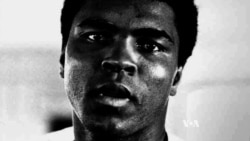I Am Ali, a new documentary by Clare Lewins, offers an intimate portrait of boxing legend Muhammad Ali, through anecdotal audio tapes he recorded with family and friends.
No one, not even some members of his family, knew of the existence of these audio tapes, until recently. One of Ali’s daughters, Hana, discovered then in a farm house the family keeps, and gave them to Lewins with her father’s blessing. They thread the narrative of the boxing champion’s life in her documentary.
The filmmaker said these tapes raise the curtain on Muhammad Ali’s private life, and she hopes that audiences will come away from this documentary with a better understanding of this complex character as a person. She says some hail him as hero for defying the U.S. government and decrying the war in Vietnam, and some may see his as a traitor for refusing to be conscripted into the U.S. military. She said that regardless of how one feels, her documentary can show his amazing spirit.
I Am Ali does not say much about his broken marriages or his womanizing, but it highlights his bond with his children. His daughter Hana said Ali was always conscious of the power of history and she believes that’s why he made those tape recordings. Her sister Maryum is also featured in those conversations. She said that when her parents got divorced he would call her and ask about school and her life dreams. “He would always tell me, ‘time is gonna fly,’” she recalled. “It’s like he could foresee things.”
Snapshots of a life
Lewins’ documentary does not chronicle Ali’s life in a linear way. By jumping around in time, connecting some of his conversations to landmarks of his earlier years, she presents a more visceral and emotional sense of his spirit. She depicts Ali’s charisma as an athlete, a leader and a symbol of power for the African-American community as well as a quick-witted joker. Although he was intimidating in the boxing ring, Lewins said, “he did not have a mean bone in his body.”
Testimonials of friends and adversaries paint the Olympian and three time boxing champion born Cassius Clay -- later Muslim convert Muhammad Ali -- as a sensitive, poignant, and courageous man. Because he refused to serve in the Vietnam War, he was stripped of his championship title, and his boxing license was revoked. His close friend, former football player Jim Brown, remembers Ali’s bravery.
“He had a lot of courage. The risk he had to take and to be isolated to have his crown taken away, not be able to make a living, that was difficult," said Brown.
It was difficult, but Ali stuck to his convictions. He did not fight again for nearly four years, losing a crucial time of peak performance. But in 1974, at the age of 32, he made a comeback. He challenged the undefeated heavyweight champion George Foreman to a boxing match in Zaire, Africa. It was promoted as “The Rumble in the Jungle.”
During a televised interview before the fight, Ali made a prediction in his signature tongue-in-cheek verse.
“I said, last night, I had a dream. When I got to Africa I had one hell of a rumble. I had to beat Tarzan first for claiming to be the king of the Jungle. For this fight I’ve wrestled with alligators. I’ve tussled with a whale; I had handcuffed lighting and put thunder in jail. You know I’m bad I have murdered a rock. I injured a stone, and I hospitalized a brick;
I am so bad I make medicine sick. I’m so fast, man, I can run through a hurricane and don’t get wet. When George Foreman meets me, he’ll pay his debt. I can drown a drink of water and kill a dead tree, wait till you see Muhammad Ali.”
The champion returns
Ali won that match - 40 years ago this month - with a knockout punch, and recaptured his title. George Foreman remembers, “I get into the ring with the guy. I bluffed him, I've done everything. Beat him up, basically for about five or six rounds. I thought it was easy. Then about the sixth round he whispered in my ear as I hit him in the side, ‘That all you got, George?’ And that was about all I had!" he added with a laugh.
As Ali has aged, his eloquence has faded. He kept fighting but suffered some humiliating losses and showed less and less of his signature style. In the late '70s, he began slurring his words, and his hands were visibly trembling: both symptoms of Parkinson’s disease. His last fight was in 1981, and in 1984 his diagnosis of Parkinson’s was confirmed. His courageous fight against the crippling disease was on display in 1996, when he lit the Olympic flame at the Atlanta Games. And Clare Lewins’s documentary, I Am Ali, shows that Muhammad Ali remains an icon of power and grace, in the eyes of his friends, his foes and especially his children.





